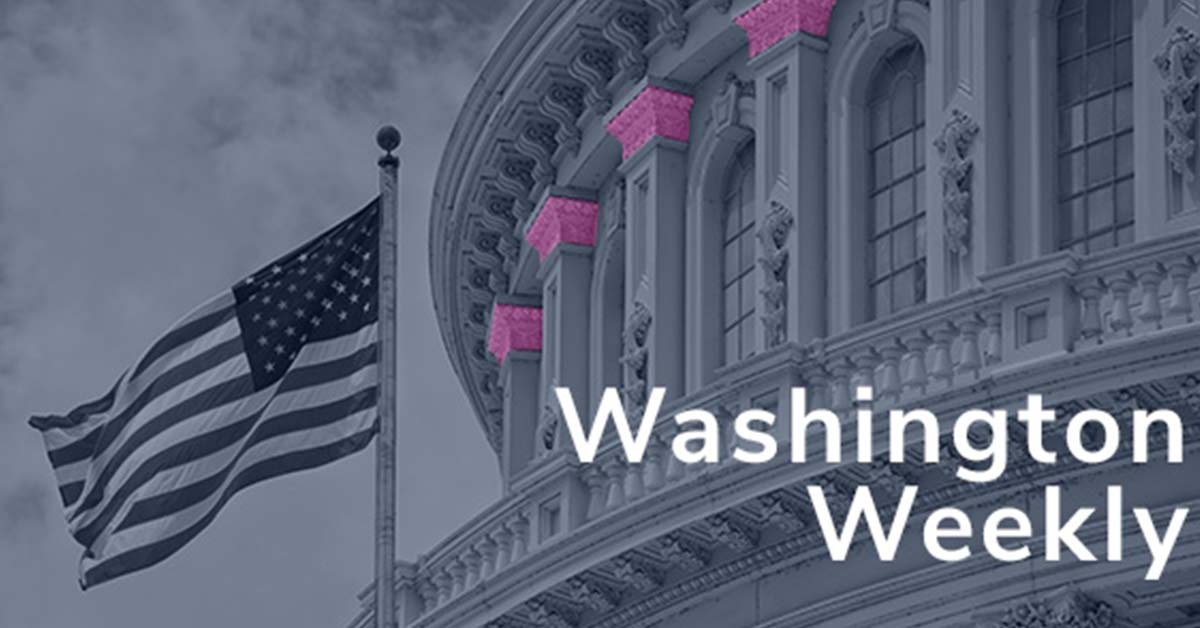
The House
A House special election for New Mexico’s 1st District will be held this week. Former Rep. Deb Haaland vacated her seat to become President Biden’s Interior secretary. The seat will likely remain Democratic, adding one more vote to the Democrats’ slim majority in the House.
The House began its Memorial Day Recess and will return to vote on June 14.
The Senate
Last week, the Senate failed to pass legislation that would create an independent, bipartisan commission to investigate the January 6 attack on the U.S. Capitol. The vote ultimately lacked three Republican votes to bypass the filibuster, where there must be 60 votes to advance a bill out of debate and into a vote.
Six Republican Senators voted to advance the bill (Bill Cassidy-LA; Susan Collins-ME; Lisa Murkowski-AK; Rob Portman-OH; Mitt Romney-UT; and Ben Sasse-NE). Senator Pat Toomey (R-PA) would also have advanced the measure but had a family commitment that kept him from voting.
The bill would create a ten-member commission evenly selected by Democratic and Republican leaders. Much of the language was based on legislation that created the 9/11 commission, which was then passed with overwhelming bipartisan support. There are calls for Democratic leadership to move forward with creating a bipartisan commission to investigate the January 6 Capitol riot as well as the moments proceeding it.
Senators Marco Rubio (R-FL) and Bob Casey (D-PA) introduced the No IPOs for Unaccountable Actors Act, a bipartisan bill that would bar Chinese IPOs from remaining in U.S. markets for non-compliance of new, strict audit rules. The bill would direct the SEC to preclude any company that is either (1) not headquartered in a jurisdiction where the PCAOB has full auditing authority or (2) is not subject to a PCAOB audit from registering and making an IPO on the U.S. Stock Exchange.
The Senate began its Memorial Day Recess and will return to vote on June 7.
The Administration
President Biden has released his proposed budget for Fiscal Year 2022 which calls for $6 trillion in federal spending that will result in a $1.8 trillion deficit for the year. The plan seeks to increase the funding levels of almost every federal agency, with the largest increase proposed for the Education Department and the smallest for the Departments of Defense and Homeland Security.
To raise revenue and close tax inequity, the President also proposes overhauling corporate taxation by increasing the corporate tax rate to 28%. This increase is estimated to account for around $2 trillion over the next decade. Additionally, the President’s plan to raise the tax rate on earnings over $400,000 and close loopholes is estimated to earn just over $754 billion. Congressional Republicans widely oppose the tax increases as well as the small increases for the Departments of Defense and Homeland Security.
The Budget also calls for increased investment in:
- Defense—to develop new technologies like AI and microchips
- Cyber—creating the office of the National Cyber Director
- Energy—to reach carbon neutrality in 30 years
- IRS—increasing its budget to boost tax enforcement and collection
- Education—increasing Pell Grant values, Title I funding, and special education funding
- Agriculture—expanding broadband access, promoting cleaner energy on farms, and making permanent a pandemic-era school lunch program
- Housing—increased funding to improve fair housing enforcement
- Interior—planning and funding focused on renewables, conservation, and tribal programs
- State—seeking 8,000 visas for Afghans who aided the U.S.; the Green Climate Fund will resurrect climate and clean energy funding for developing nations cut off during the Trump administration
- Transportation—funding to electrify the U.S. postal service fleet
- Gun violence—increase federal funding for firearm violence research
The plan is largely viewed as a political document and is not binding. Its recommendations will be considered by Congress, who will choose which provisions to adopt.
In commemorating the 100th anniversary of the Tulsa Race Massacre, President Biden also announced actions to close the racial wealth gap. The initiatives will target homeownership and small business ownership by publishing two new rules that will align federal enforcement with the Fair Housing Act and provide HUD the authority requiring public and private entities to re-evaluate established practices that contribute to inequalities. The President is also expected to reverse two Trump-era housing rules.
Becker’s Federal Lobbying Team will continue to monitor these developments as they evolve and will share with you as soon as information becomes available.